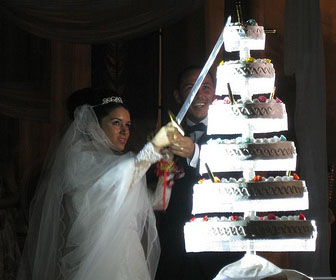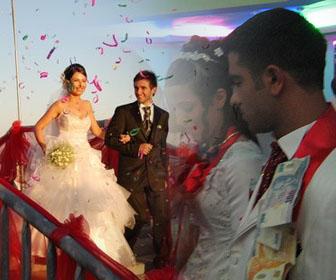 |
 |
| |
|
| |
|
| |
Love and Marriage in Turkey

|
| |
 |

|
|
| |
|
|
|
| |
Love, marriage and divorce may seem like
straightforward topics, but Turkish customs concerning love and
family are a bit different than American traditions. r>
While the Muslim faith condones polygamy, most Turkish households
consist of one man and one woman, in deference to Turkish law.
Similar to many cultures, a Turkish couple becomes engaged when the
potential groom asks the potential bride's parents for their
daughter's hand in marriage. (Arranged marriages are not as common
as they once were, but Islamic law still technically prohibits
pre-marital dating or courtship.) Usually, gifts are offered by the
groom or exchanged between the groom's family and the bride's
parents, though the tradition of a dowry is mostly only practiced in
rural areas anymore.
The wedding ceremony can be conducted in the bride or groom's home,
a hotel ballroom or a government wedding hall. It is conducted by a
civil official because marriages conducted by a religious authority
are considered invalid. Because no Koran passages are read, the
ceremony is usually rather short. Following in the western
tradition, a bride usually wears white and a groom will opt for a
suit or tuxedo. Afterward, there is almost always a reception
involving food and dancing.
The vast majority of couples opt to have children; the typical
family size is two adults and two kids. (This number is higher
outside of urban areas.) Today, about 20 percent of Turkish
households include extended family, such as grandparents.
Divorce is very rare in Turkey, but if a marriage should end in
divorce, each party leaves the relationship with whatever
possessions they brought into it. Anything they acquired together as
a couple goes to the person who acquired them "first." The law
prohibits divorced women from re-marrying within 300 days of the
finalization of their divorce.
|
|
| |
|
|
| |
|
|
|
<-Back
|
|
 |
|
